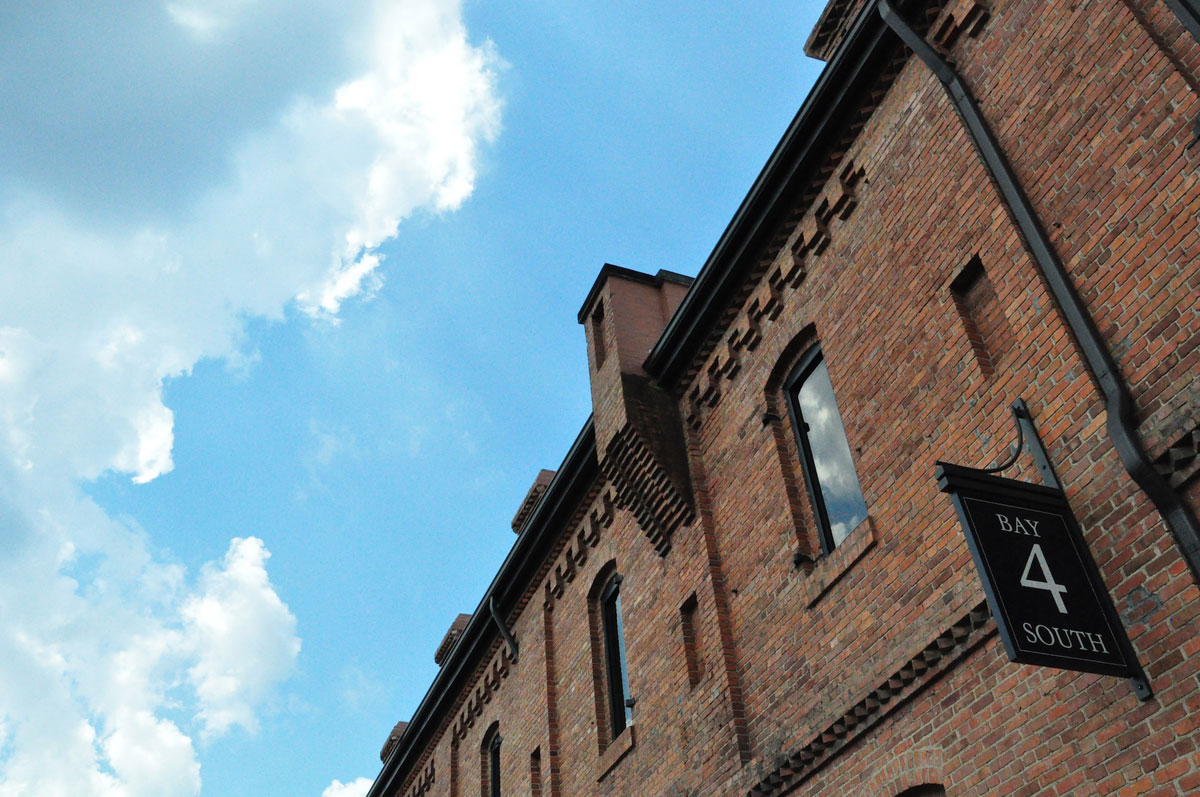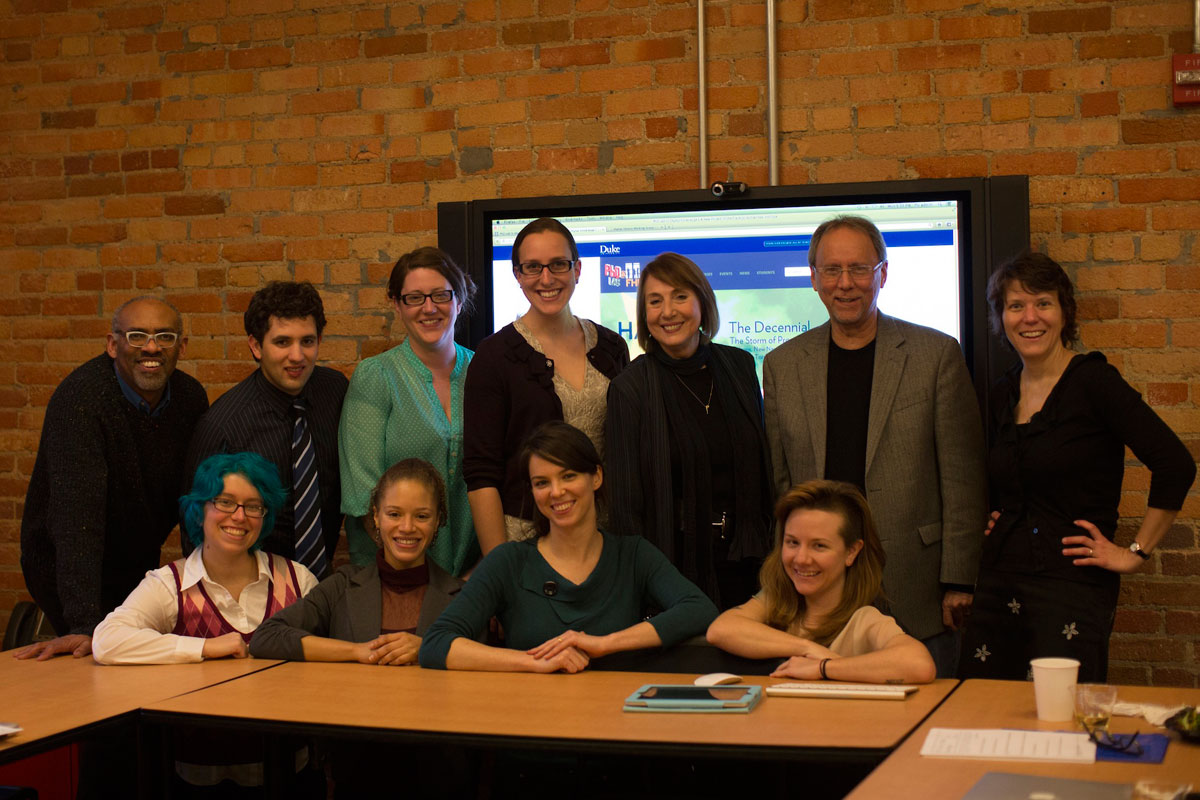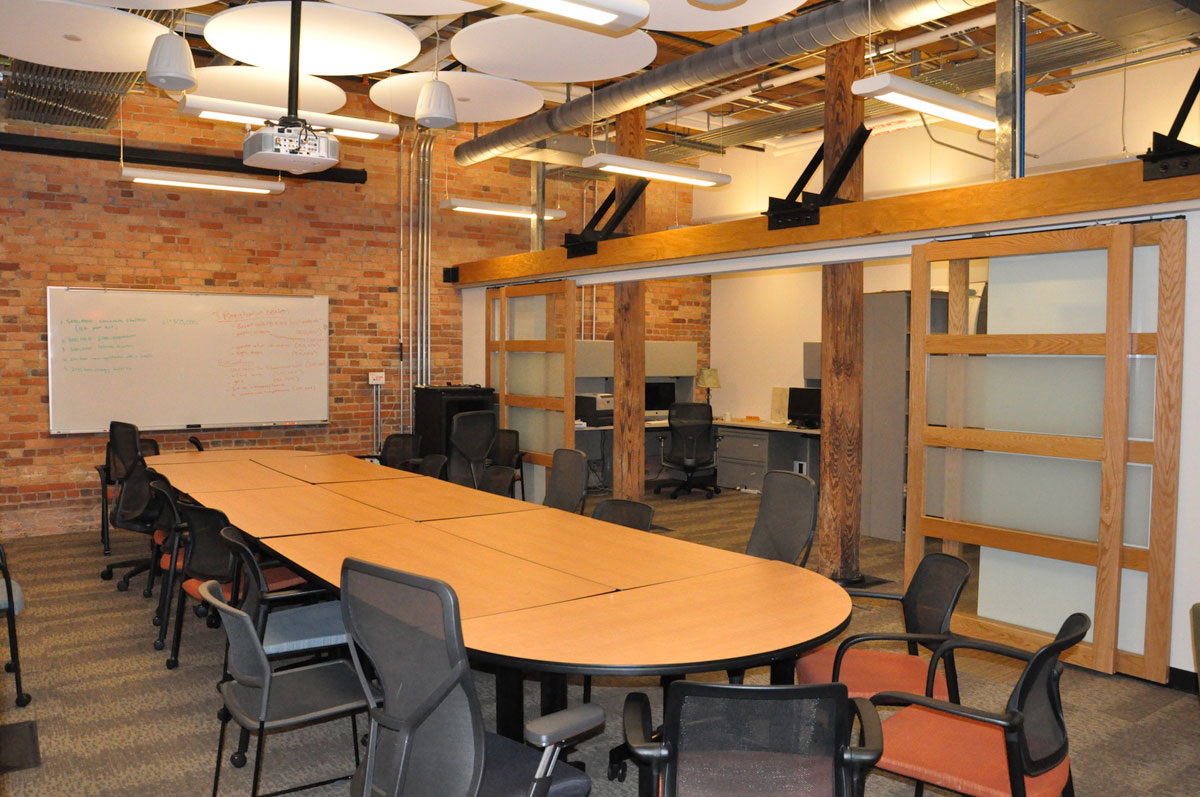Duke PhD Lab in Digital Knowledge
Part of the John Hope Franklin Humanities Institute, Duke’s PhD Lab in Digital Knowledge provides both a practical and a conceptual framework for graduate students to learn about digital scholarship and apply it to their own research and teaching. For more information, contact Cathy Davidson or David Bell, or visit the website.
Mission
To provide an arena in which PhD students in the humanities and interpretive social sciences can learn about new digital scholarship, engage with its challenges, and see its promise for their own research and professional lives within or outside the university.
Launched in 2012, the PhD Lab in Digital Knowledge is a new initiative of Duke’s Franklin Humanities Institute (FHI). The collaborative and experimental environment of the Lab establishes a community of scholarship and practice for graduate students in the arts, humanities, and interpretive social sciences. In the virtual and physical space of the Lab, graduate students can learn not only the skills needed to work comfortably in digital environments, but also various approaches, philosophies, and motivations for exploring and applying such skills.
The Lab incorporates courses, workshops, public events, and informal group meetings to approach questions of digital scholarship from a variety of angles. The Lab’s mission and structure are driven by the students, so while the broad aims of the Lab will remain stable, the specific goals will change from one year to the next.

The Franklin Humanities Institute is housed in a converted early 20th-century warehouse.
Founded in 1999, the Franklin Humanities Institute supports a variety of endeavors related to humanistic inquiry, with an emphasis on collaboration, interdisciplinarity, and relevance to issues of social equity. The PhD Lab is linked to FHI’s broader Humanities Laboratories Initiative, a collection of thematic projects and areas of inquiry involving faculty, graduate assistants, and undergraduate students. The FHI Humanities Laboratories are, in turn, part of the Humanities Writ Large initiative, a five-year project funded by the Mellon Foundation with the broad aim of redefining the role of the humanities in undergraduate education.
People
Director David F. Bell brings together a diverse cohort of approximately twelve PhD and MFA students from disciplines across the arts, humanities, and interpretive social sciences.
The first cohort of the PhD Lab comprised twenty graduate students from a range of disciplines in the humanities, social sciences, and arts. The active participation of five artists in the Duke MFA in Experimental and Documentary Arts program enriched the Lab and contributed to a truly interdisciplinary environment, with a great diversity of methods and approaches. No matter what their background, applicants to the program recognize that the Lab offers something unique and valuable that they would not ordinarily receive as a part of their regular course of study. Scholars are admitted to the program for one year, and have the option to re-apply for subsequent years. Allowing for continued participation over multiple years will foster an environment with increased opportunities for peer-to-peer teaching and knowledge sharing.
David F. Bell
Structure
The one-year renewable program includes courses, workshops, and public events centered around two or three overarching topics; scholars meet informally every two weeks as they work toward the development of an e-portfolio, which they present to one another at the end of the year.
In addition to a variety of components available to help scholars work together as they build digital skills and work products, the PhD Lab also includes a selection of public programming and workshops. The program is designed to have a flexible structure so that it can adapt to the needs and interests of its participants. Each year, the work will be centered around one or two overarching themes—such as peer-to-peer teaching, digital publishing, working with data, or online learning. In addition to the thematic component, the program will guide scholars toward thinking critically about their online self-representation, and the year’s work will culminate in the creation of an online portfolio that they can use for personal or professional purposes.
Scholars meet every two weeks over dinner to discuss their work, goals, and the skills they are learning. During some sessions, they also build websites or collaborative projects and offer one another constructive feedback. Discussion continues in a fluid and ad-hoc manner depending on need and interest: many conversations evolve in online environments, and scholars also have some funds available to facilitate casual group meetings (over meals, for instance). Some of their vibrant conversations can be found on their group blog on the Humanities, Arts, Science, and Technology Advanced Collaboratory (HASTAC) network, which they use as a space to think through questions, approaches, goals, and possibilities.
Above all, the structure is driven by student need and interest. For instance, the initial semester began with very loose parameters, and when it became apparent that additional structure would serve the scholars’ needs, the plans for the second semester were adapted accordingly. Each year will vary depending on personalities, projects, strengths, and challenges.

Members of the 2012–2013 cohort of PhD Lab scholars, along with affiliated faculty member Richard J. Powell, Cathy N. Davidson and director David F. Bell.
Research
The capstone project for participating scholars is an e-portfolio that integrates approaches the students have learned about online self-presentation and more specific thematic topics, such as peer-to-peer teaching. Scholars also develop collaborative projects.
Participating scholars work toward the creation of e-portfolios: online bodies of work that document the skills and approaches they have learned in the preceding semester. The e-portfolios also serve as a useful product for the scholars as they develop their own preferences for the ways that they present themselves and their work online and in other public environments.
Collaborative projects are also integral to scholars’ time in the Lab, and illustrate the interdisciplinary and public-facing nature of their work. Two examples of works-in-progress are Soundbox, a project that explores the use of sound in scholarly productions, and an interdisciplinary dialogue on the Ecology of Networks that will culminate in a multimodal Scalar publication.
Scholars have funding available to travel to conferences and otherwise present their work to a broader public audience. Public communication is an essential facet of the Lab’s goals, and students are encouraged to think broadly about ways to present their work beyond the walls of the university. Even in the short time that the program has been in operation, the scholars and faculty involved in the Lab have produced exciting, vibrant research that they are sharing with the community.
Support
The program operates on internal funding provided by Trinity College of Arts and Sciences, Duke Graduate School, and the Franklin Humanities Institute.
The Lab operates on internal support from Trinity College of Arts and Sciences, Duke Graduate School, Duke Provost’s Office, and the Franklin Humanities Institute; the FHI also serves as the Lab’s institutional home. While participating scholars do not receive a monetary fellowship, they do have some funding available for conference travel in order to present their work publicly, as well as space and a limited amount of funds to facilitate collaborative work. Select scholars in future cohorts will have the opportunity to work as teaching assistants in the Lab.

The Franklin Humanities Institute features a blend of old and new materials, with exposed brick and HVAC systems adjacent to airy work spaces and cutting edge technology.
Directions
With a mission that is largely student-driven, this experimental program will change according to student needs and feedback. While students do not receive funding, several teaching assistantships may be available to participating students in future years.
While the long-term direction of the PhD Lab depends very much on its constant evolution from one semester to the next, Davidson and Bell hope that an increasing number of students will be able to participate so that they can benefit from the exciting work and conversations happening in the lab. Middle-range goals include enabling students to have a professional, creative, engaging online profile so that they know how to represent themselves; gain increased sensitivity to diverse new ways of teaching with peer pedagogy and emerging technologies; and demonstrate how the skills and approaches learned in the Lab are being applied in the undergraduate classrooms where the scholars typically teach.
Nuts & Bolts
A program that is as flexible and experimental as this requires a good deal of institutional understanding in order for the program to evolve according to student needs.
Launching a program along the lines of the PhD Lab requires both institutional support and a great deal of flexibility. If you plan to implement a program like this, consider some of the following questions:
- If the program will be housed outside of a department, do you have the support of the departments whose students will be involved?
- Will the additional workload be difficult for graduate students to incorporate into their schedules without financial compensation?
- Do you have physical space available for spontaneous conversations and collaborative work? How about virtual space?
- Will the faculty and staff involved be able to adapt to changing schedules as the structure shifts?